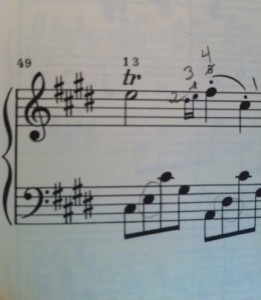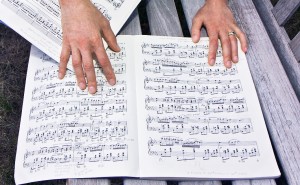When I joined the concert pianist Simone Dinnerstein in her home studio, I asked questions not as a classical music critic or a piano pedagogue. Rather, I came as myself, Nancy M. Williams, a student of adult piano lessons. Our discussion touched on piano practice adjectives, inner voices and the Bach Prelude in C Major. She gave a private rendition of the Bach Prelude in B Minor, part of her new album, Night. The sum total of her inspirational advice and pointers gets to the primary concern of readers of GRAND PIANO PASSION™: how we as adult students of the piano may deepen our study.
Simone Dinnerstein is famed for her expertise in Bach, for her debut with the Goldberg Variations and her two subsequent albums containing works by Bach. During the interview, Ms. Dinnerstein treats us to the Bach Prelude in B Minor. The prelude is a transcription by Alexander Siloti, based on Bach’s original Prelude in E Minor, and is part of her 2013 album, Night. She recorded the album with Tift Merritt, an acclaimed folk singer. In a departure of sorts, only one of the tracks is devoted to Bach, to the Prelude in B Minor. The album, says Ms. Dinnerstein, is “about a time of freedom, a time when the lack of light is actually making you able to try something new.”
I was surprised to learn that early in her career, Simone Dinnerstein taught adult piano lessons, and yet in retrospect that information makes sense. In the interview, she seemed to fuse her past experience as a teacher with her current role as an international concert pianist and one of the world’s foremost interpreters of Bach. I hope you will enjoy as much as I do this video interview, its wisdom for students of all ages committed to piano practice.




I am curious about why Siloti changed the key of this prelude from the original E minor, and also why the Presto at the end was not included — and why Simone chose to play this version rather than the original. Bach tended to be very particular about which key went with which kind of music. Not that it can’t be altered if that’s someone’s vision, however.
Harriet, these are good questions, and in the research I’ve done on Siloti’s transcription, I haven’t seen an explanation for Siloti’s decisions such as changing the key. As for why Simone Dinnerstein decided on the transcription rather than the original, I think that the transcription has become a piece in its own right, and she was very attracted by Emil Gilel’s performance.
Bach is a really interesting composer and hearing her
talk about him sheds new light on him. I’ve always played Bach
“straight” but I would love to play around and take a chance and play him
differently.
Pat, thanks for writing. I know what you mean about now feeling liberated to play Bach in different ways.
hmmmm….Bach a la Debussy.